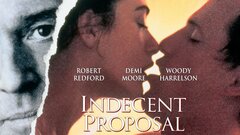Adrian Lyne

Director • Writer • Producer
Birth Date: March 4, 1941
Age: 83 years old
Birth Place: Peterborough, Cambridgeshire, England, UK
Filmmaker Adrian Lyne is an Academy Award-nominated director and producer of such erotically-charged features as "Flashdance" (1983), "Nine ½ Weeks" (1986), "Fatal Attraction" (1987) and "Unfaithful" (2002). Lyne's films were balanced carefully on the line between art and exploitation - while impeccably polished and produced, his pictures never shied away from depicting the darker aspects of human sexuality. Lyne also directed more arthouse-oriented fare like "Jacob's Ladder" (1990) and "Lolita" (1997), making him a filmmaker who was hard to define.
Born March 4, 1941 in Peterborough, Cambridgeshire, England, Lyne was raised in London and studied at the prestigious Highgate School, where his father was an educator. After a brief stint as a jazz trumpeter, Lyne took to filmmaking and directed several shorts before moving into television commercials, which would have a significant effect on his style as a feature film director. He made his debut with "Foxes" (1980), a downbeat look at the lives of four teenage girls in the San Fernando Valley circa the late 1970s. Jodie Foster was top-billed as the most level-headed of the quartet, who tries unsuccessfully to keep her friends (Cherie Currie, Marilyn Kagan and Kandice Stroh) from the pitfalls of sex and fast living. While the film did little at the box office during its brief theatrical run, "Foxes" cemented Lyne as a director who could depict the seamier side of women's sexuality in a manner that would be appealing to audiences, albeit one mostly male.
Three years later, Lyne struck pay dirt with "Flashdance" (1983), a rags-to-riches story about a young welder (Jennifer Beals) who struggles to achieve her dreams of dancing on Broadway. Driven by Lyne's kinetic visuals - which drew considerable influence from music videos and a pop-rock soundtrack by Giorgio Moroder that included the Academy Award-winning song "Flashdance What a Feeling" - the movie was panned by reviewers for its flimsy plot. "Flashdance" did, however, reap major returns at the box office, mainly from younger viewers, who helped make it the third highest-grossing film in 1983. Several of Lyne's set pieces from the film - most notably the strip club routine, which climaxes with a shower of water from the ceiling, and Beals' go-for-broke audition before a stuffy gaggle of conservatory teachers - became fixtures in the pop culture consciousness, earning their share of tributes and parodies.
Flush with the success of "Flashdance," Lyne was reportedly set to work on the science fiction romance "Starman" (1984) for producer Michael Douglas, but was eventually replaced by genre favorite John Carpenter. He then moved on to a project of more daring, "9 ½ Weeks" (1986), a story of a sadomasochistic romance with Mickey Rourke and Kim Basinger as the erotically supercharged couple. Even glossier than his previous projects, Lyne evoked the slick, emotionless look and feel of high-end European pornography with his visuals, which were again driven by a synthesizer-heavy soundtrack of pop hits and rock tunes. The film proved to be the first of many conflicts over content that Lyne would have with producers - upon seeing his completed feature, producers demanded cuts in the numerous sexual encounters between Rourke and Basinger, as well as changes in tone, such as a scene in which the pair carry out a suicide pact. A studio-approved, R-rated version was eventually released to theaters alongside an unrated cut. Lyne's actions on set earned controversy as well - he reportedly fostered an antagonistic relationship between Rourke and Basinger, which resulted in considerable tension between the actors. The film was roundly panned by critics and fared only moderately well in ticket sales, but became a top seller on American VHS and with overseas audiences.
Lyne rebounded with "Fatal Attraction" (1987), a hot-blooded thriller with Michael Douglas as an attorney and family man who becomes involved with a publishing editor (Glenn Close). Though Douglas puts the brief affair behind him, Close obsessively tries to retain her hold on him, mounting a terror campaign that escalates from harassment to attempted homicide. An impressive mix of high-end shock and psychological thriller, "Fatal Attraction" was a colossal success at the box office and touched off a cultural discussion about infidelity, and perceptions about male and female sexuality. Many social critics, however, lambasted the film for its alleged misogyny, and pointed to the original ending - which had Close committing suicide and blaming Douglas for her death - as evidence of an unfair bias toward her character. But reviewers were largely unanimous in their praise for Lyne's work, while he was nominated for an Academy Award and Director's Guild Award. The film would eventually kick off a small flood of thrillers with similarly deranged female antagonists, including "Single White Female" (1992) and "The Hand That Rocks the Cradle" (1993).
Lyne made a surprising follow-up to "Fatal Attraction" with "Jacob's Ladder" (1990), an ambitious supernatural thriller about an ex-GI (Tim Robbins) who is plagued by horrific visions after returning from Vietnam. For once, Lyne's overactive visuals helped to sell an unsettling storyline. But the script by Bruce J l Rubin proved to be far too dense for most viewers to appreciate its twist ending, which borrowed heavily from the Ambrose Bierce short story "An Occurrence at Owl Creek Bridge" and a modern interpretation of the Tibetan Book of the Dead. Despite its limited theatrical run, "Jacob's Ladder" wielded a heavy influence on horror features, darkly-themed music videos and video games throughout the next couple of decades.
Lyne returned to more salacious material with "Indecent Proposal" (1993), a limp morality play about newlyweds (Demi Moore and Woody Harrelson) whose innocence is stripped away by a corrupt millionaire (Robert Redford), who offers them a cool million for one night with Moore. A turgid drama built on cardboard characters and the flimsiest of plot turns, "Indecent Proposal" nevertheless repeated the success and controversy generated by "Fatal Attraction," earning Lyne his third bona fide Hollywood hit. Unfortunately, it also marked him as a filmmaker whose projects were driven by studio meetings and test audiences rather than any particular passion. Meanwhile, his continued reliance on attractive actors in various states of undress to sell his dramas was gradually viewed as more exploitative than adventurous.
Rankled by this growing perception, he began work on a new film version of one of his favorite novels, Vladimir Nabokov's "Lolita" (1997), which had previously been adapted by Stanley Kubrick in 1962. Lyne went to great pains to inform the media and potential audiences that his version would not only distance itself from Kubrick's take, but adhere closely to the source material - a daunting consideration, given its story of an obsessive sexual relationship between a teenage girl and a much older man. Though well acted by Jeremy Irons, playing Humbert Humbert, and Dominique Swain as the titular Lolita, the subject matter made it poisonous to nearly every American distributor, forcing its premiere on cable network Showtime, which saw record audiences tuning in. Meanwhile, Critics had a mixed response - some felt that Lyne's close adaptation robbed the film of the book's humor, while others responded well to the performances and not to Lyne's direction. It eventually reaped its returns through VHS and DVD rentals.
Lyne remained absent from theaters until 2002, when he returned with "Unfaithful," another tense and sexually charged drama about infidelity, which was remade from Claude Chabrol's 1969 French thriller "La Femme Infidele." Initially viewed as a somber drama about an unhappy couple (Richard Gere and Diane Lane) who unravel tragically in the wake of an affair between the wife and a French bookseller (Olivier Martinez), the story changed dramatically after the studio insisted on a more upbeat take on the couple. According to many sources, the shoot was difficult - Lyne insisted on piping smoke onto the set for visual effect, which played havoc with the actors' respiratory systems, while shooting countless takes of the sexual encounters, which left Lane and Martinez physically and emotionally exhausted. He also reportedly shot five different endings, ultimately favoring a more ambiguous conclusion where Gere, who murders Martinez in the film's climax, g s unpunished for the crime. Fox pulled the original ending and replaced it with the morally responsible one, only to yank that version after negative response from test audiences. Lyne was called in to reinstate the "Hollywood" ending just five weeks before its release date.
While "Unfaithful" performed moderately well in theaters, critics were largely unkind to the film, save for Diane Lane, who was singled out for near-universal praise for her brave performance. She would eventually net top acting honors from the National Society of Film Critics and New York Film Critics Association, while earning Academy Award and Golden Globe nominations. The film was widely viewed as the instigation for her return to leading actress status in feature films. Following "Unfaithful," Lyne was associated with several projects, including "Stompanato," a biopic of screen legend Lana Turner and her ill-fated relationship with mobster Johnny Stompanato, and a film version of Chuck Hogan's crime novel "Prince of Thieves."
Credits

Deep WaterStream

Becoming Iconic

Back RoadsStream

UnfaithfulStream

UnfaithfulStream

LolitaStream

Indecent ProposalStream

Jacob's LadderStream

Fatal AttractionStream

Nine 1/2 WeeksStream

FlashdanceStream
















